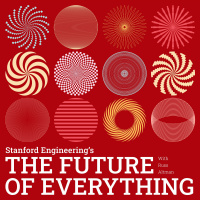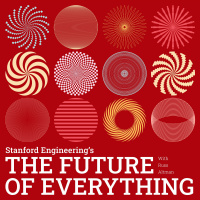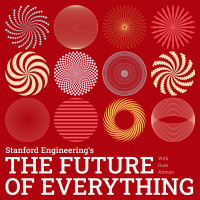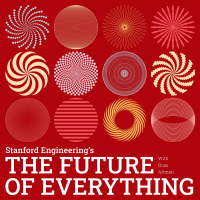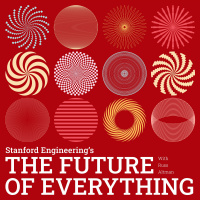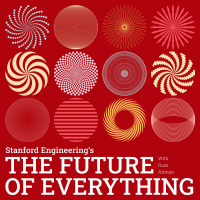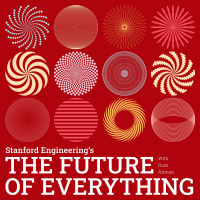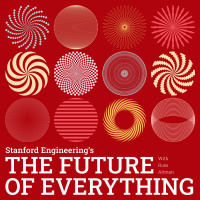Stanford Radio
- Author: Vários
- Narrator: Vários
- Publisher: Podcast
- Duration: 245:56:46
- More information
Informações:
Synopsis
Podcast by Stanford Radio
Episodes
-
E74 | Michelle Monje: New therapies for brain cancer
25/03/2019 Duration: 27minThe Future of Everything with Russ Altman: "Michelle Monje: New therapies for brain cancer" A deepening understanding of how the healthy brain grows and functions is leading to exciting new brain cancer therapies that are both more effective and easier on patients. Brain cancers are known to be elusive and clever killers, but Michelle Monje, associate professor of neurology and neurological sciences, is helping to find new treatments through a better understanding of how healthy brain cells develop and how cancers often hijack those very same processes in order to grow themselves. Monje says that the last decade has seen tremendous progress in our understanding of how cancers thrive and in the development of new drugs and therapies to kill the killers. Unfortunately, many chemotherapy drugs powerful enough to kill cancers also cause lasting impairment of the patient’s cognitive abilities, a condition known among doctors and patients as “chemobrain.” Monje is on the hunt for more effective and safer treatm
-
What it's Like Being the President of a Major League Baseball Team w/ guest Dave Kaval
25/03/2019 Duration: 28minStanford Pathfinders with Howard Wolf: "What it's Like Being the President of a Major League Baseball Team w/ guest Dave Kaval" Dave Kaval, President of the Oakland Athletics talks about his career in sports and the A's quest to build a new ball park. Originally aired on March 23, 2019. Recorded at Stanford Video.
-
E76 | Dennis Wall: The changing face of autism diagnosis and treatment
25/03/2019 Duration: 28minThe Future of Everything with Russ Altman: "Dennis Wall: The changing face of autism diagnosis and treatment" AI is reshaping diagnosis of autism, making it quicker, less expensive and more accurate. As a result, interventions are coming earlier in life, a key to more effective treatment. The current process for diagnosing autism requires no less than 10 hours of intensive doctor-to-patient observation. It is expensive and time-consuming, says autism expert Dennis Wall, an associate professor of pediatrics and of biomedical data science at Stanford. Wall is developing new ways to tackle the problem. He says advances in machine learning, a branch of artificial intelligence focused on training computers to perform important medical tasks, stand to shake up the field. He’s developing computer models that can spot autism by watching just a few minutes of video of a child at play in their natural home environment. With these technologies, diagnosis happens in as little as four minutes. In addition, Wall says,
-
Football Powerhouse Andrew Luck Discusses His Life and Career
11/03/2019 Duration: 28minStanford Pathfinders with Howard Wolf: "Football Powerhouse Andrew Luck Discusses His Life and Career" From growing up as a child in Germany to choosing to attend Stanford University, this football great talks about his Stanford days, reveals some of his favorite memories on and off the football field, and discusses his bright future with the NFL. Originally aired on SiriusXM on March 9, 2019. Will re-air with a fresh preface mentioning his retirement on September 7, 2019. Recorded at SiriusXM in New York City.
-
E73 | Xiaolin Zheng: New benefits of combustion revealed
11/03/2019 Duration: 27minThe Future of Everything with Russ Altman: "Xiaolin Zheng: New benefits of combustion revealed" Humankind has prospered greatly from fire, but that doesn’t mean we know all its secrets. Mechanical engineer Xiaolin Zheng really likes to burn things, but she is more like a modern-day Prometheus than a pyromaniac. She uses combustion to create minute nanoparticles of various metal oxides that have many practical and valuable uses in today’s world. For instance, she has created nanoparticles that can turn water into hydrogen peroxide using only energy from the sun. Hydrogen peroxide is a powerful disinfectant that kills microbes and removes other pollutants from water. Zheng imagines creating inexpensive, portable, solar-powered water purifiers to help the two to three billion people in the world who lack access to plentiful potable water. Originally aired on SiriusXM on March 9, 2019. Recorded at Stanford Video.
-
The Intersection of Language and Race with guest Jonathan Rosa
04/03/2019 Duration: 28minSchool's In with Dan Schwartz and Denise Pope: "The Intersection of Language and Race with guest Jonathan Rosa" Jonathan Rosa is a linguistic anthropologist and an assistant professor at the Stanford Graduate School of Education. He discusses how language and race intersect, and how teachers can approach these language differences in the classroom. Originally aired on SiriusXM on March 2, 2019. Recorded by Stanford Video.
-
Constructive Vigilance with Larry Diamond
25/02/2019 Duration: 28minStanford Pathfinders with Howard Wolf: "Constructive Vigilance with Larry Diamond" Larry Diamond, senior fellow at the Hoover Institution and the Freeman Spogli Institute for International Studies, discusses his recent report, “Chinese Influence & American Interests: Promoting Constructive Vigilance,” and the compelling conclusion it draws about China’s manipulation attempts in the United States Originally aired on SiriusXM on February 23, 2019. Recorded at Stanford Video.
-
E71 | Billy Loo: “FLASH” radiation therapy brings hope to cancer patients
25/02/2019 Duration: 27minThe Future of Everything with Russ Altman: "Billy Loo: “FLASH” radiation therapy brings hope to cancer patients" This technology aims to eliminate cancer while minimizing collateral damage to surrounding healthy organs. Stanford radiation oncologist, Billy Loo, says that a new generation of radiation therapy technology called PHASER will be so fast that it can even compensate for the patient moving during treatment. High-energy X-rays will be fired so quickly, like a flash photograph, that motion is frozen and radiation can be more precisely focused on tumors. His research team is also finding that such ultra-fast “FLASH” radiation kills cancer cells through new biological mechanisms while causing less damage to healthy tissues. Loo says that while radiation benefits two-thirds of U.S. patients, half of patients with cancer around the world lack access to these curative technologies. To address issues of access, the Stanford Radiation Oncology and SLAC National Accelerator Laboratory team is designing PHA
-
E72 | Londa Schiebinger: Why does gender matter?
25/02/2019 Duration: 28minThe Future of Everything with Russ Altman: "Londa Schiebinger: Why does gender matter?" From designing research to setting priorities for funding decisions and drafting policy, understanding gender differences enhances all phases of scientific research. In safety engineering, ergonomic differences between men and women are important. Conventional seat belts do not fit pregnant women properly and motor vehicle crashes are the leading cause of fetal death related to maternal trauma. Analyses of sex differences have led to the development of pregnant crash test dummies that enhance safety in automobile testing and design. In medicine, osteoporosis has been conceptualized primarily as a women's disease, yet after a certain age men account for nearly a third of osteoporosis-related hip fractures. Tragically, when men break their hips, they tend to die. We don't know why. Analyzing the interaction between sex and gender in osteoporosis has led to new diagnostics for men, and the search for better treatments is
-
Learning Differences with guest Elizabeth Kozleski
19/02/2019 Duration: 27minSchool's In with Dan Schwartz and Denise Pope: "Learning Differences with guest Elizabeth Kozleski" Elizabeth Kozleski is a Dean’s Senior Scholar for Teaching and Learning at Stanford Graduate School of Education. She discusses inclusiveness, learning differences and how children are tracked into special education classrooms. Originally aired on SiriusXM on February 16, 2019. Recorded at Stanford Video.
-
Global Effort to Educate Girls with guest Kathryn Moeller
19/02/2019 Duration: 28minSchool's In with Dan Schwartz and Denise Pope: "Global Effort to Educate Girls with guest Kathryn Moeller" Kathryn Moeller is a visiting scholar at the Lemann Center at Stanford Graduate School of Education. She is the author of the 2018 book, The Gender Effect: Capitalism, Feminism, and the Corporate Politics of Development. She discusses the global effort to educate girls and women, and how empowerment programs are sometimes based on questionable evidence. Originally aired on SiriusXM on February 16, 2019. Recorded at Stanford Video.
-
Gene-edited Babies with guest Hank Greely
19/02/2019 Duration: 28minStanford Legal with Pam Karlan & Joe Bankman: "Gene-edited Babies with guest Hank Greely" Hank Greely, an expert in ethical, legal, and social implications of new biomedical technologies, discusses gene-edited babies and DNA testing on this episode of Stanford Legal. Originally aired on SiriusXM on February 16, 2019 Recorded at Stanford Video.
-
Doing Business with China with guest Curtis Milhaupt
19/02/2019 Duration: 27minStanford Legal with Pam Karlan & Joe Bankman: "Doing Business with China" How has China managed to grow in the world economy? Stanford Law Professor Curtis Milhaupt, an expert in Asian legal systems and state capitalism, discusses his research into Chinese state-owned businesses -- and the implications the Chinese planned economy has for policy makers in the U.S. Originally aired on SiriusXM on February 16, 2019. Recorded at Stanford Video.
-
Disrupting Group Healthcare with guest Ali Diab
11/02/2019 Duration: 29minStanford Pathfinders with Howard Wolf: "Disrupting Group Healthcare with guest Ali Diab" Ali Diab, co-founder of Collective Health, a company which works to find new ways to address the intractable problem of rising healthcare costs, explains why he believes every CEO in America is in the healthcare business, and how to balance the needs of companies and employees. Originally aired on SiriusXM on February 9, 2019. Recorded at Stanford Video.
-
E70 | Robert Reich: Is it time to rethink philanthropy?
11/02/2019 Duration: 28minThe Future of Everything with Russ Altman: "Robert Reich: Is it time to rethink philanthropy?" Philanthropy is often driven by the idiosyncratic pet notions of the very rich. It is an exercise of power that deserves our scrutiny, not our automatic gratitude. Why do well-off public schools often demand that parents supplement school programs with personal contributions? Why do many rare diseases receive the lion’s share of donor attention and money? Is basic science being driven by the whims of big donors? These are questions that keep Stanford political philosopher Rob Reich up at night. Reich says that philanthropy is at an ethical crossroads in which the heart often leads the head in determining which causes get showered with money while other, perhaps more deserving, ones go without. Originally aired on SiriusXM on February 9, 2019. Recorded at Stanford Video.
-
Democracy on the Ballot with guest Nate Persily
04/02/2019 Duration: 27minStanford Legal with Pam Karlan & Joe Bankman: "Democracy on the Ballot with guest Nate Persily" Voting law expert Nate Persily discusses gerrymandering, the 2018 midterms and the 2020 census. Originally aired on SiriusXM on February 2, 2019. Recorded at Stanford Video.
-
The Rights of Immigrants with guest Katrina Eiland
04/02/2019 Duration: 28minStanford Legal with Pam Karlan & Joe Bankman: "The Rights of Immigrants with guest Katrina Eiland" Katrina Eiland, staff attorney with the ACLU's Immigrants’ Rights Project, discusses the Trump administration's termination of DACA, and family separation policy. Originally aired on SiriusXM on February 2, 2019. Recorded by Stanford Video.
-
E68 | Carlos Bustamante: Genomics has a diversity problem
28/01/2019 Duration: 28minThe Future of Everything with Russ Altman: "Carlos Bustamante: Genomics has a diversity problem" A geneticist explains how the relatively young science of genomics has the potential to reveal the mysteries of the living world, but first it has to be more inclusive. Carlos Bustamante is an expert in genomics—the study of genetic variation and its effects on the living world. He says genomics holds tremendous promise but, so far, virtually all sequenced DNA comes from European blood lines and this presents a problem. Without greater diversity in the genomic data that is collected, he notes that we cannot fully reap the benefits of this knowledge, particularly in areas such as healthcare. "Genomics is the new oil," Bustamante says, of the opportunities that lie ahead. It's being used for everything from studying rare diseases to developing more effective drugs. Before its potential can be fully realized,however, genomics will have to address its diversity problem. The more genetic variants that are represent
-
E69 | Toomas Ilves: Lessons in digital democracy from Estonia
28/01/2019 Duration: 27minThe Future of Everything with Russ Altman: "Toomas Ilves: Lessons in digital democracy from Estonia" The former president of Estonia discusses how a small Baltic state became a world leader in digitization of everything from voting to medicine. Of the many nations that have implemented some measure of digital democracy, none perhaps has had more success than Estonia. Toomas Ilves, a Distinguished Visiting Fellow at the Hoover Institution, would know: He served as president of the Baltic state for two terms. Ilves says that all Estonians have verifiable digital identities and they use them to vote, sign legal documents, order prescription medication, file taxes and more online. Estonian digitization began with schools and banking in the 1990s. Online voting followed in the early 2000s. Today, a third of Estonians vote online. Faith in the system is high, Ilves says. The country has a single voter registry and voters can confirm – and even change – their votes right up to the deadline. Estonia’s latest effor
-
Giving Better with guest Rob Reich
28/01/2019 Duration: 28minStanford Pathfinders with Howard Wolf "Giving Better with guest Rob Reich" Rob Reich, professor of political science at Stanford and author of "Just Giving: Why Philanthropy Is Failing Democracy and How It Can Do Better.”, explains how the current laws and policies that structure philanthropic activity tend to favor the interests of wealthy individuals. Originally aired on SiriusXM on January 26, 2019. Recorded at Stanford Video.

